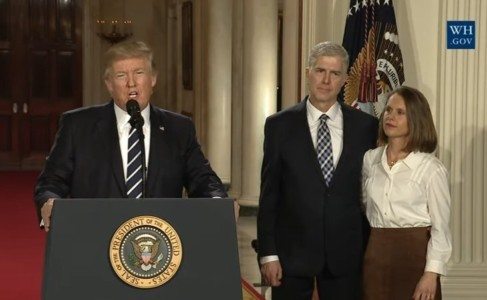WASHINGTON — President Donald Trump nominated Judge Neil Gorsuch on Tuesday evening to fill the seat on the U.S. Supreme Court left open by the sudden death of Justice Antonin Scalia in February 2016.
President George W. Bush appointed Gorsuch to the federal bench in 2006, after he worked in the Bush administration for two years as a deputy associate attorney general at the U.S. Department of Justice. Gorsuch currently serves as a judge on the U.S. Court of Appeals for the Tenth Circuit, which has jurisdiction over Wyoming, Kansas, Oklahoma, Utah, New Mexico, and his native Colorado.
Gorsuch is considered one of the most intellectual jurists on the federal bench, evinced by his gilded pedigree. He received his undergraduate degree from Columbia University in 1988 and graduated from Harvard Law School in 1991. Later in his career, he earned a Ph.D. from Oxford University in 2004. He would be the first Supreme Court justice in decades to hold a doctoral degree.
He’s had a picture-perfect legal career. He served as a law clerk for Judge David Sentelle on the U.S. Court of Appeals for the D.C. Circuit, then clerked for both Justice Byron White and later Justice Anthony Kennedy on the U.S. Supreme Court. He went on to a very successful career in the private sector before joining the Bush Justice Department in 2005.
Gorsuch has embraced a textualist view of constitutional interpretation, including language that suggests he might share Justice Scalia’s view that judges should further construe the text only in a manner consistent with its original meaning. In Cordova v. City of Albuquerque (2016), he wrote:
Ours is the job of interpreting the Constitution. And that document isn’t some inkblot on which litigants may project their hopes and dreams . . . but a carefully drafted text judges are charged with applying according to its original public meaning. If a party wishes to claim a constitutional right, it is incumbent on him to tell us where it lies, not to assume or stipulate with the other side that it must be in there someplace.
That same year, Gorsuch authored a scholarly publication about judicial philosophy, in which he explained his view that
an assiduous focus on text, structure, and history is essential to the proper exercise of the judicial function. That, yes, judges should be in the business of declaring what the law is using the traditional tools of interpretation, rather than pronouncing the law as they might wish it to be in light of their own political views, always with an eye on the outcome…
He concluded: “Though the critics are loud and the temptations to join them may be many, mark me down too as a believer that the traditional account of the judicial role Justice Scalia defended will endure.”
Gorsuch is known for a number of constitutional rulings that conservatives have applauded. He has consistently ruled in favor of religious liberty. In American Atheists v. Duncan (2010), he took the position that the Constitution’s Establishment Clause permits roadside memorials honoring fallen state troopers on public land. Regarding the free exercise of religion and federal statutes, he took the position that Obamacare’s contraceptive mandate violated Hobby Lobby’s rights under the Religious Freedom Restoration Act, a case that eventually became a landmark Supreme Court case.
He has not been as outspoken on some other issues, such as the Second Amendment, but has nonetheless been generally supportive of gun rights when the matter has come before him.
Judge Gorsuch was born in 1967 in Denver, Colorado. At age 49, he would be one of the youngest justices in decades, nearing Justice Elena Kagan’s age (50) when she was confirmed in 2010.
Gorsuch has been married to his wife Marie for 20 years. They have two teenage daughters together.
Source: Breitbart

